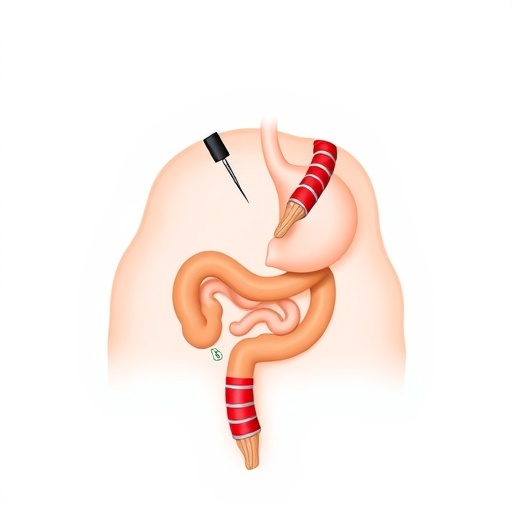In recent years, the field of pediatric surgery has witnessed significant advancements, particularly concerning technologically-driven procedures aimed at improving the quality of life for children suffering from gastrointestinal disorders. One compelling study recently emerged from this arena, exploring laparoscopic-assisted transanal Soave procedures for the treatment of refractory constipation in children. This innovative surgical technique presents a promising solution for addressing chronic gastrointestinal issues that often result in prolonged discomfort and distress for young patients and their families alike.
The study, led by renowned researchers Yang, Huang, and Fu, outlines the various dimensions of a laparoscopic-assisted approach to the Soave operation, which is traditionally a conventional surgical intervention. By utilizing minimally invasive techniques, the research aims to shed light on the outcomes and effectiveness of this surgery in treating children afflicted with obstructive defecation, a condition that can significantly impact everyday life and emotional well-being.
Refractory constipation, although a commonly encountered condition in the pediatric population, poses unique challenges to healthcare professionals. Many children suffer from bowel movement difficulties due to various underlying diseases, gastrointestinal malformations, or chronic neurological conditions. Traditional treatment options often fall short, compelling healthcare providers and surgical teams to explore alternative methods that yield more favorable results. The Soave procedure, designed to rectify anorectal malformations through a transanal approach, is gaining attention as a promising option for these young patients.
With a more nuanced understanding of the challenges facing children with these conditions, researchers are increasingly investigating the optimal surgical techniques that prioritize patient safety and recovery times. Laparoscopic-assisted procedures leverage advanced technologies to minimize tissue trauma, leading to reduced postoperative pain and rapid recovery. This aligns perfectly with the objectives of pediatric care, where minimizing distress and discomfort is essential.
The article presents an extensive analysis of the surgical technique, walking readers through the operative steps involved in the laparoscopic-assisted transanal Soave. This method ensures that the surgeon can achieve the necessary surgical correction with utmost precision while minimizing the impact on surrounding tissues. Surgeons can navigate the intricate anatomy of pediatric anorectal structures with enhanced visualization provided by laparoscopic cameras, thereby improving overall surgical outcomes.
Moreover, the authors detail the preoperative and postoperative protocols adopted during their clinical trial. Preoperative evaluations are meticulously designed to optimize patient selection and ensure that candidates are appropriately prepared for the surgery. Close monitoring during the postoperative phase is equally crucial, as it helps to catch potential complications early and guides necessary interventions. This level of thoroughness is essential for maintaining high standards of patient care and outcomes.
The data analyzed in the study encompasses numerous cases, providing a comprehensive overview of surgical outcomes observed over a defined period. It includes metrics such as the duration of hospital stays, complication rates, and the overall satisfaction of families post-surgery. Such details not only highlight the efficacy of the laparoscopic-assisted transanal Soave procedure but also serve to inspire confidence among families considering surgical options for their children.
As with any surgical intervention, risks must be carefully weighed against the anticipated benefits. The article thoroughly discusses potential complications associated with laparoscopic interventions, such as inadvertent injuries to adjacent organs, bleeding, and infection. Transparent communication regarding these risks contributes to informed decision-making, an essential component of patient and family-centered care.
In addition to clinical rigor, the emphasis on patient-centered care shines throughout the research narrative. The authors underscore the importance of engaging families in the decision-making process and providing thorough counseling to alleviate fears and uncertainties surrounding surgery. Empathy and support are woven into the fabric of this revealed surgical practice, reminding healthcare professionals of their pivotal roles not just as surgeons but as compassionate caregivers.
The potential for surgical innovations to transform pediatric healthcare is a recurring theme within the study’s findings. The laparoscopic-assisted transanal Soave method exemplifies the direction in which the field is heading—toward less invasive techniques that promise quicker recoveries and enhanced patient satisfaction. As technological advancements continue to make their mark, one can only speculate about the future of surgeries aimed at treating complex pediatric gastrointestinal issues.
Following the results of this research, the scientific community stands on the precipice of a new frontier in pediatric surgery that combines cutting-edge technology with compassionate care. By adopting techniques like laparoscopic-assisted surgery, healthcare providers can address the pressing challenge of refractory constipation, potentially altering the lives of countless children and their families. The impact of this study extends far beyond the individual cases highlighted; it serves as a catalyst, encouraging ongoing research and innovation within the realm of pediatric gastroenterology and surgery.
Finally, the authors advocate for further investigation into the long-term outcomes of children who have undergone the laparoscopic-assisted transanal Soave procedure. Understanding the durability of surgical results and clarifying the need for additional interventions will provide invaluable insight for both clinicians and families. As pediatricians, surgeons, and researchers continue collaborating across interdisciplinary lines, the future of children’s health looks increasingly bright, marked by empathy, innovation, and resilience.
In conclusion, the exploration of laparoscopic-assisted transanal Soave surgery represents a significant step forward in addressing complex pediatric issues. By striving for excellence in surgical outcomes, prioritizing patient-centered care, and embracing advancements in technology, the medical community can ultimately turn the tide in favor of children suffering from refractory constipation. This innovative approach not only enhances surgical effectiveness but fosters a renewed sense of hope for families navigating this challenging terrain.
Subject of Research: Refractory Constipation in Children and Laparoscopic-assisted Transanal Soave Procedure
Article Title: Laparoscopic-assisted transanal soave for refractory constipation in children: outcomes and management
Article References:
Yang, Z., Huang, L., Fu, Y. et al. Laparoscopic-assisted transanal soave for refractory constipation in children: outcomes and management.
BMC Pediatr 25, 896 (2025). https://doi.org/10.1186/s12887-025-06291-3
Image Credits: AI Generated
DOI: https://doi.org/10.1186/s12887-025-06291-3
Keywords: Pediatric Surgery, Laparoscopic Techniques, Refractory Constipation, Soave Procedure, Minimally Invasive Surgery, Gastrointestinal Disorders, Patient-Centered Care, Surgical Outcomes




